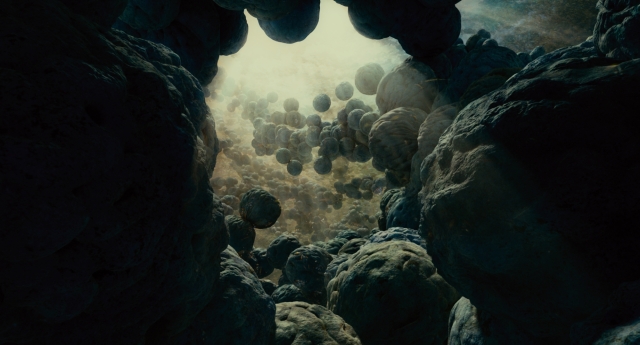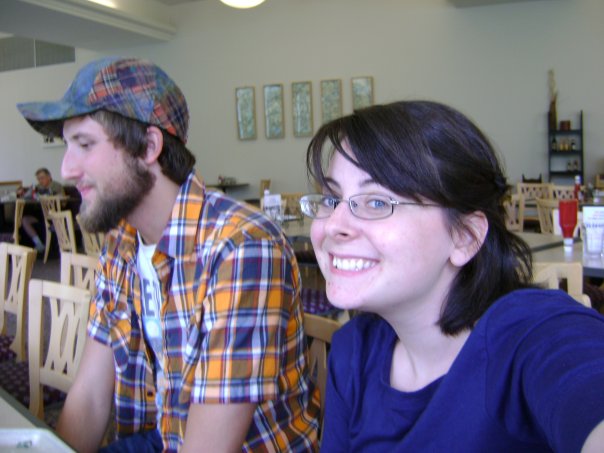 Over the weekend, some of my progressive Christian friends were grousing on Twitter about how growing up in ‘90s Evangelical culture and being taught that we would be raptured up to heaven before anything terrible happens in the world, ever, left us ill-equipped to face the reality that we would one day die.
Over the weekend, some of my progressive Christian friends were grousing on Twitter about how growing up in ‘90s Evangelical culture and being taught that we would be raptured up to heaven before anything terrible happens in the world, ever, left us ill-equipped to face the reality that we would one day die.
I quit believing in the rapture early on in high school when I realized it was inconsistent with Jesus’s own teachings on the end-times, but in retrospect I can see how this denial of death bled over even into the forms of Christianity towards which I was drawn in my teens and early twenties. In the doomsday cult I was a part of in college, we believed we would be impervious to the bullets fired at us in the Middle East by the Antichrist and his hordes of demonically driven Muslim supporters.
“If it wasn’t time for us to be dead,” my friend April* told me, “God could just send us back down. So that might be a really great option! Whenever we’re in any kind of danger, we can just shoot each other! Like if they were going to behead you, I could just SHOOT you and then Jesus could send you back!”
“I don’t think I like where this is going…” I said in a low voice.
April cocked an imaginary gun. “‘I’LL SEE YOU IN A MINUTE!’” she yelled.
After I left the group I began studying Gnostic groups (like ours) that believe they have a special mission to accomplish at the end of history. This sense of being in a cosmic drama relieves us of the appalling tedium of being not-particularly-special people living in a fairly uneventful period of history. One writer made a point that has stuck with me: he said that these Gnostic groups, even the ones that call themselves Christian, deny the wisdom of the Old Testament writers that life is an incredible mystery, and that everything that has a beginning must also have an end—ourselves, our relationships, our accomplishments, the world itself.
And I don’t think I fully got that until I stood in front of my friend’s coffin, face to face for the first time in my life with the awful specter of mortality. Nothing in my upbringing or religious education had prepared me for this. Bethany had been there not long ago and now she was just gone. I could spend the rest of my life roaming the earth trying to find her and would never find her. The body in the coffin had once belonged to her, but now it resembled her less and less. I had no idea what to make of this. As I wrote in my journal on the day after the visitation, “She was dead and I suddenly had no idea where her soul had gone, or if she even had one.”
I had already begun to abandon the convoluted eschatological scheme accepted by most Evangelicals (seven years of tribulation followed by a thousand-year reign of Jesus) before Bethany’s death—the Catholic Church which I was in the process of joining teaches only that Jesus will return at some point in the future and set up his kingdom forever. The rest is just speculation. But it was only after I had thrown out most of what I had been taught and believed all my life about the end of the world that I ran into a problem—namely, that science already has a pretty clear idea how the world is going to end, and it’s pretty grim.
Basically, carbon life has only existed on earth for about two billion years out of the roughly fifteen billion years of the lifespan of our universe. The first Homo sapiens emerged some tens of millions of years ago, only a second ago in geologic time, sweeping down out of the trees onto the savannahs with a miraculous awareness of themselves that is surely the greatest mystery and miracle of cosmic history—“the universe,” as one scientist put it, “becoming aware of itself.”
Barring some nuclear or ecological disaster, our species and life on our planet as a whole will lumber along for another few hundred million years until we are wiped out by an asteroid, a comet, a meteor, a chance collision of two black holes somewhere in our galaxy, an explosion from a neighboring supernova or some other ghastly and xenocidal event. Assuming we manage to survive each of these extinction-level threats, within a mere five billion years the sun will enter the next stage of its life cycle, becoming a red giant and swelling up to gargantuan proportions, in the process casually destroying the three closest planets in its orbit.
Of course by then it’s entirely possible that we’ll have developed the means of leaving earth and colonizing other solar systems. But even if we do, it turns out we’re only delaying the eventual end of our species, for the stars are going out one by one, leaving us in a cold void of perpetual night.
On the bright side, if there is one, this is still an inconceivably vast number of years away from happening, and by the time the sun winks out, everyone you know will be dead. Maybe you’re okay with that. It’s hard enough getting people to care about rises in ocean levels that will flood coastal regions and cause massive droughts, leading to war and famine, in the lives of our children and grandchildren. Still fewer are kept up at night by the cosmological certainty that our species will eventually be annihilated when the sun, the giver of life, blows up and devours its own offspring. But I am.
It troubles me because even as a child I had a mystic’s eye for the goodness and beauty of the world, because I believed that this world is full of more good things than we can possibly dream or imagine, and love makes it hard for me to accept that all this—the churches of Greenwich, the bistros of the Left Bank, the factories of Birmingham and Philadelphia; every piece of flannel, every strip of paper, everything you ever built or wrote—will perish in solar fires, unobserved and unremembered. Surely if anything can test a person’s faith, it is this. Philosopher Bertrand Russell felt keenly the implications for humanity when he wrote, “All the labors of the ages, all the devotion, all the inspiration, all the noonday brightness of human genius, are destined to extinction in the vast death of the solar system … The whole temple of Man’s achievement must inevitably be buried beneath the debris of a universe in ruins.”
Perhaps Shakespeare glimpsed something of the futility in which all humanity’s ambitions must end when he had King Lear ask, “Is man no more than this?” This is the sort of question people of faith are going to have to take seriously, if we want to be taken seriously by the rest of the world in our time.
As a Christian blogger, I’m supposed to state here that it’s all going to be okay and we don’t have to be afraid of extinction and Jesus will come down and save us before the universe reaches Threat Level: Midnight. But I don’t know that for a fact, and you don’t, either. In this life we’re given promises, but no guarantees. We have assurances, but no certainties. That’s why it’s called faith.
Ironically, part of what led to my current existential crisis was the Catholic faith in natural processes, in the idea—going all the way back to St. Augustine, who developed an early theory of evolution to describe how life on earth had come into being—that God uses natural methods and natural laws to accomplish his purposes in the natural realm. (This is still a major source of division between Catholics and Protestant fundamentalists: it was a Catholic priest and astronomer, Georges Lemaitre, who first proposed what became known as the Big Bang theory, which is almost uniformly rejected by fundamentalists who don’t seem to realize how it converges with the Genesis account). Once I accepted that maybe God had used a slow unfurling of cosmic evolution to bring the worlds into being over a span of eons, I couldn’t help wondering if maybe God would end space-time in precisely the same way: slowly, over many billions of years.
I spent much of yesterday reading a book by John Polkinghorne, a renowned Cambridge physicist—his work was instrumental in the discovery of the quark in the 1960s—who is also an Anglican priest and amateur theologian. The book, The God of Hope and the End of the World, summarizes his conversations with several other scientist-theologians at Yale University who are trying to reconcile our scientific knowledge of the eventual extinction of our species with the Christian faith in a bodily resurrection in which God raises individuals from death and restores them to their bodies in a natural environment. (The belief I was taught growing up, that when we die, our spirits leave our gross bodies behind and fly up to heaven to be with Jesus forever, is actually Gnostic).
Polkinghorne and his colleagues raise several possibilities for how this might happen in a way that doesn’t contradict current scientific findings or Christian orthodoxy. For example, maybe the information-bearing part of a human being (what we call “the soul”) is stored in God’s memory after death until the day of resurrection. Maybe we all die at different times and then find ourselves together again at the same time, as happened in the final episode of LOST. Maybe we awaken to find that the billions of years between our death and the end of the old universe have already transpired while we slept.
Ultimately, as even Polkinghorne himself seems to concede, none of these answers can be entirely satisfying because they all have to be taken on faith. “Any hope of a destiny beyond death,” he writes, “can ultimately rest only on the faithfulness of God the Creator.” In the end we’re left only with hope: hope that we were created for a purpose; hope that our creator loves us; hope that this world of unthinkable beauty is leading us towards a world of beauties even more unthinkable.
And, if I’m being honest, hope is what I’ve been missing ever since Bethany’s death. She trusted God to protect her, and God seems to have failed her. After she died, I could no longer entrust myself to pious certainties. People die. People are murdered or take their own lives and no deity intervenes to save them. Terrible things happen because this world can be a terrible place, because humans are terrible and depraved and a savage darkness lurks in even the most devout heart. Just look at what they did to Jesus.
And ultimately that’s why I remain a Christian, because even with all my doubts and questions I know I’m not asking anything new or original. Nothing has changed in human nature just because we now understand that the sun will eventually destroy us. It was Thomas Kempis in the twelfth century who said, “Look on all things as passing away, and thyself as doomed to pass away with them.” It was Job who asked why man is born to trouble, and it was Jesus who in the agony of his final hours dared to ask God why he had been forsaken, and heard only silence in response.






 “But which is more important:
“But which is more important:
